November 27, 2025 | 07:26 GMT +7
November 27, 2025 | 07:26 GMT +7
Hotline: 0913.378.918
November 27, 2025 | 07:26 GMT +7
Hotline: 0913.378.918
On March 20, Mr. Do Duc Duy, Vietnamese Minister of Agriculture and Environment, held a meeting with Mrs. Boutsadi Santipitaks, Executive Director of the Mekong River Commission (MRC) Secretariat, and the delegation from the MRC Secretariat. Both sides discussed issues related to water resources, the environment, and cooperation among countries in the Mekong River basin, with the aim of protecting water resources, developing agriculture, and improving the management of these resources.
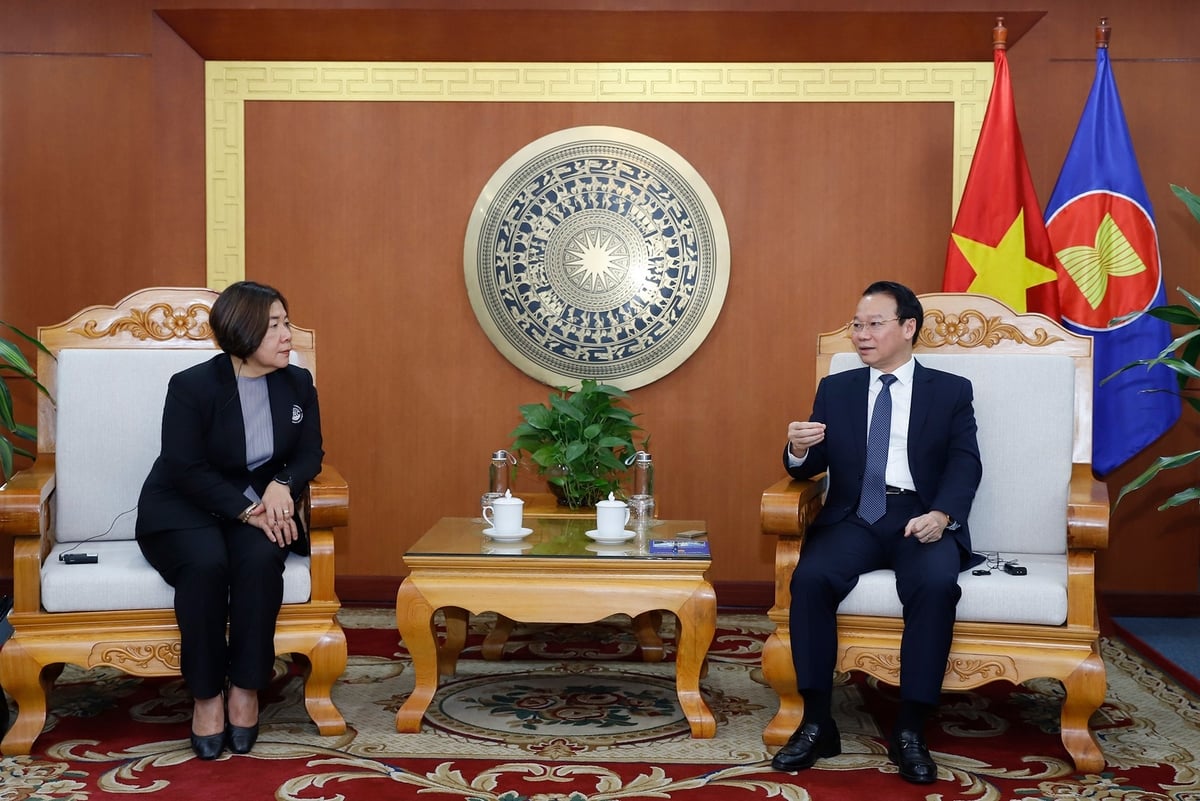
Minister Do Duc Duy met and worked with Mrs. Boutsadi Santipitaks, the Executive Director of the Mekong River Commission Secretariat. Photo: Khuong Trung.
During the meeting, Mrs. Boutsadi Santipitaks emphasized the critical importance of the cooperation between Vietnam and the Mekong River Commission (MRC). She highlighted that, in the current context, issues related to water resources, the environment, and climate change are becoming increasingly complex. These issues have far-reaching consequences that affect not only Vietnam but also other countries in the region. Therefore, she expressed a strong desire to receive valuable information sharing and strategic guidance from the leadership of Vietnam's Ministry of Agriculture and Envinronment.
In response, as the Permanent Vice Chairman of the Vietnam Mekong River Commission, Minister Do Duc Duy emphasized that Vietnam would prioritize fostering close cooperation among MRC member countries, especially regional partners and international organizations.
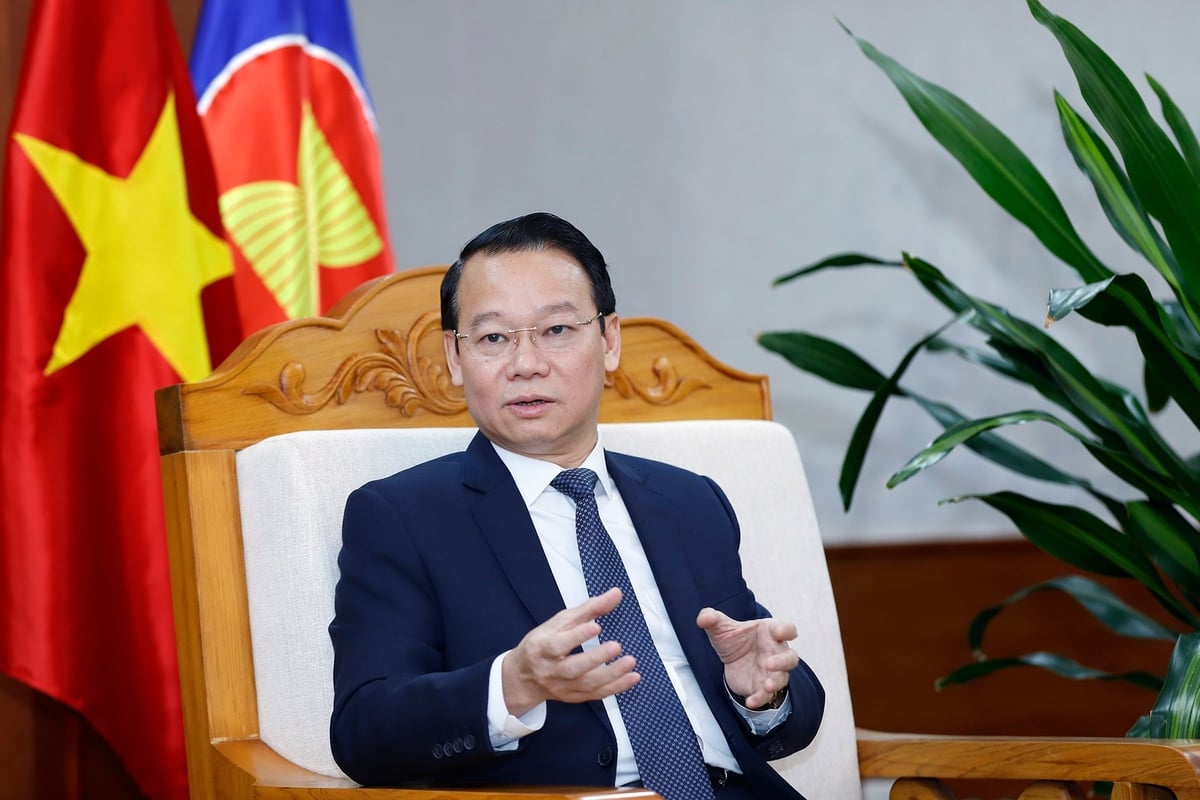
Mr. Do Duc Duy, Vietnamese Minister of Agriculture and Environment. Photo: Khuong Trung.
The Minister committed to actively calling for support from member countries and emphasized the importance of cooperation among countries in addressing water resource issues and protecting the environment in the Mekong River basin.
In a discussion with the MRC Executive Director, Minister Do Duc Duy shared the current challenges faced by the Mekong Delta, particularly the impacts of climate change and natural disasters. Over the past 15 years, the region has experienced significant changes in weather patterns and extreme weather events, ranging from flooding caused by the Mekong River to land subsidence, droughts, saltwater intrusion, and other issues related to climate change.
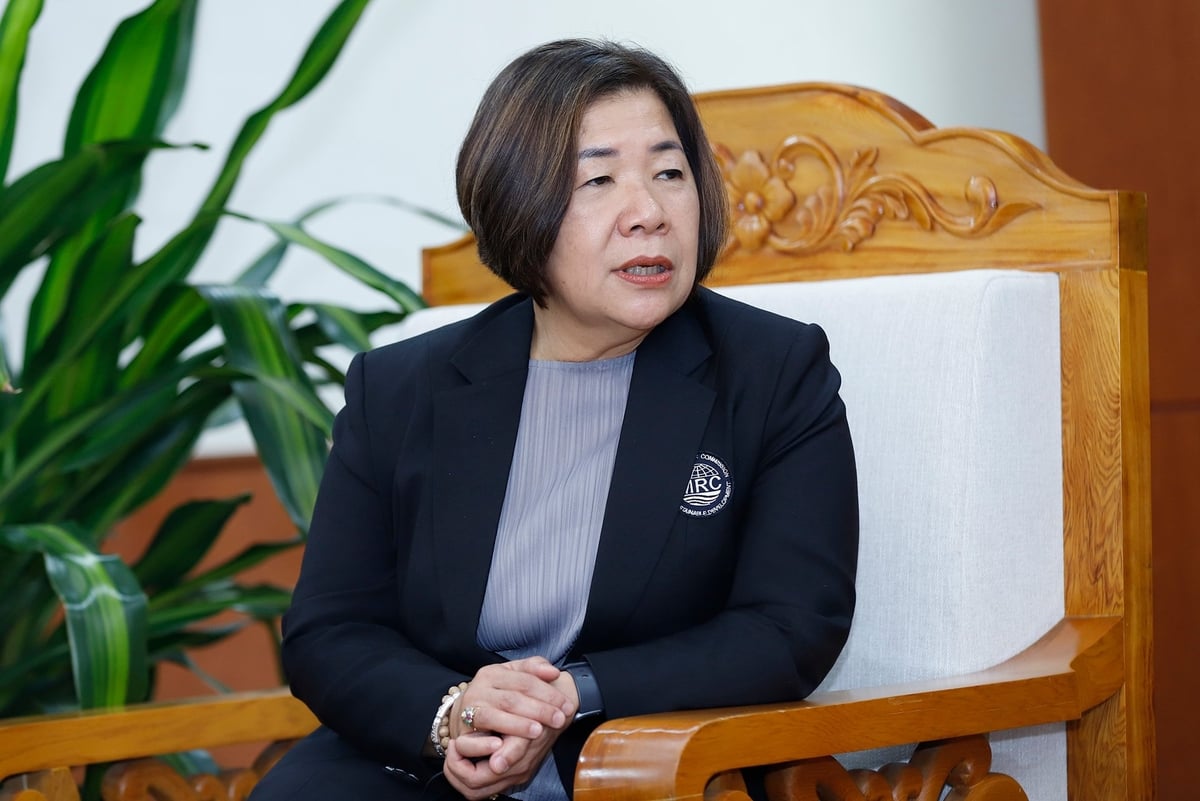
Mrs. Boutsadi Santipitaks, Executive Director of the Mekong River Commission Secretariat. Photo: Khuong Trung.
The Minister stated that the Vietnamese government is currently developing a comprehensive plan for disaster prevention and climate change adaptation in the Mekong Delta region. This plan is designed to address three primary causes: the reduction in water flow from the upper Mekong River, the socioeconomic development of the Mekong Delta in Vietnam as well as in other countries in the region, and the growing impact of climate change.
In light of these challenges, Minister Do Duc Duy proposed a range of collaborative solutions with the Mekong River Commission to improve the management of water resources and disaster response in the Mekong River basin.
One of the main proposals made by the Minister was to enhance disaster forecasting and early warning systems. Minister Do Duc Duy pointed out that while countries in the region, including Vietnam, Thailand, Cambodia, and Laos, have established early warning systems, these systems need to be upgraded and fine-tuned to address the specific challenges posed by climate change.
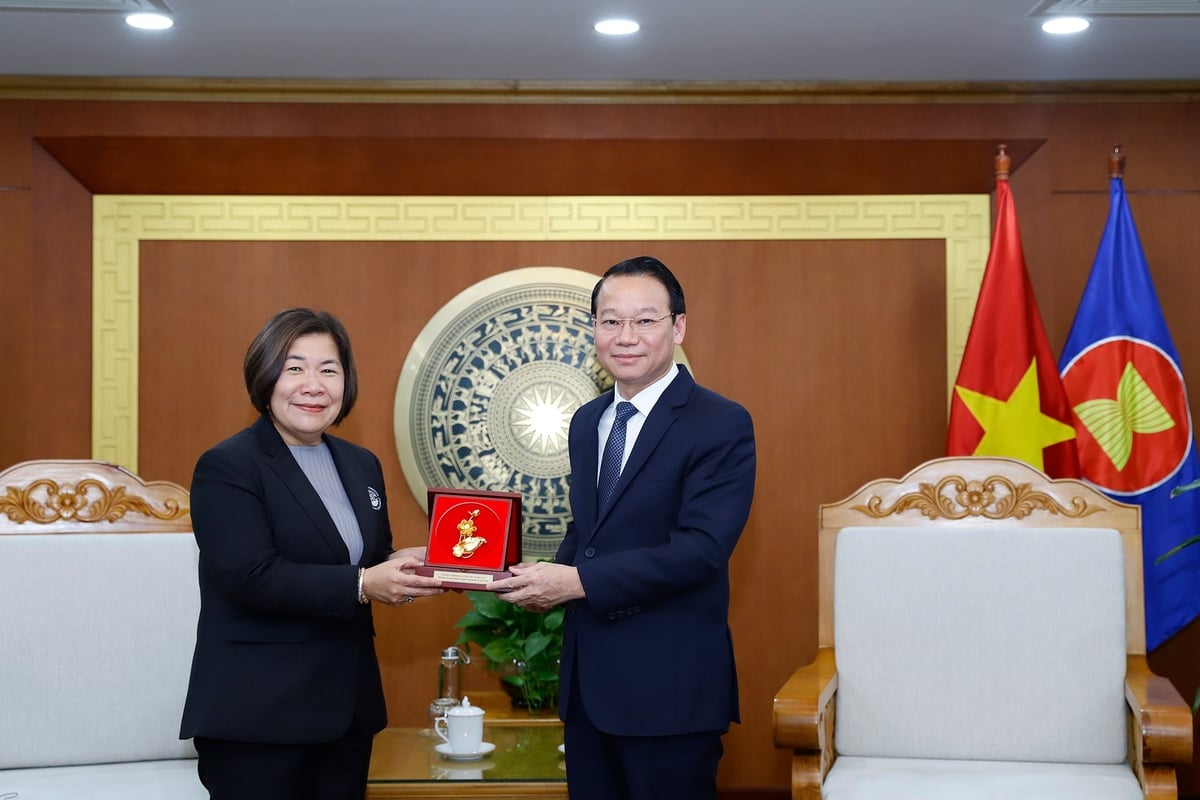
Minister Do Duc Duy presents a souvenir to Mrs. Boutsadi Santipitaks, Executive Director of the Mekong River Commission (MRC) Secretariat. Photo: Khuong Trung.
In addition to the points raised, the Minister highlighted the crucial need for substantial investment in databases and monitoring systems. He emphasized that modernizing monitoring stations in the Mekong River basin is vital, particularly those that collect data on meteorology, hydrology, and environmental factors.
"Data and information sharing between countries is extremely important to enable nations to be more proactive in disaster response and in developing response scenarios", Mr. Do Duc Duy explained.
Furthermore, the Minister proposed that the MRC should expand its collaboration to include countries outside ASEAN, focusing on developing comprehensive water resource management plans for the entire Mekong River basin. This would require creating water resource scenarios that account for both the current situation and future projections. The Minister also stressed the importance of high-level dialogues and fostering a collaborative spirit among countries and international partners, as well as strengthening the MRC’s and its Secretariat's capacity for independent operation.
Mrs. Boutsadi Santipitaks, the Executive Director of the MRC Secretariat, expressed her appreciation for the strategic directions shared by Minister Do Duc Duy. She underscored the importance of building comprehensive databases and developing robust forecasting models. "These are crucial for supporting the countries in the Mekong River basin to effectively respond to the escalating challenges posed by both natural disasters and climate change", she shared.
She also agreed with the Minister’s idea that the MRC should continue its dialogues with partners outside the MRC region to enhance international cooperation, especially on issues related to water resources and the environment.
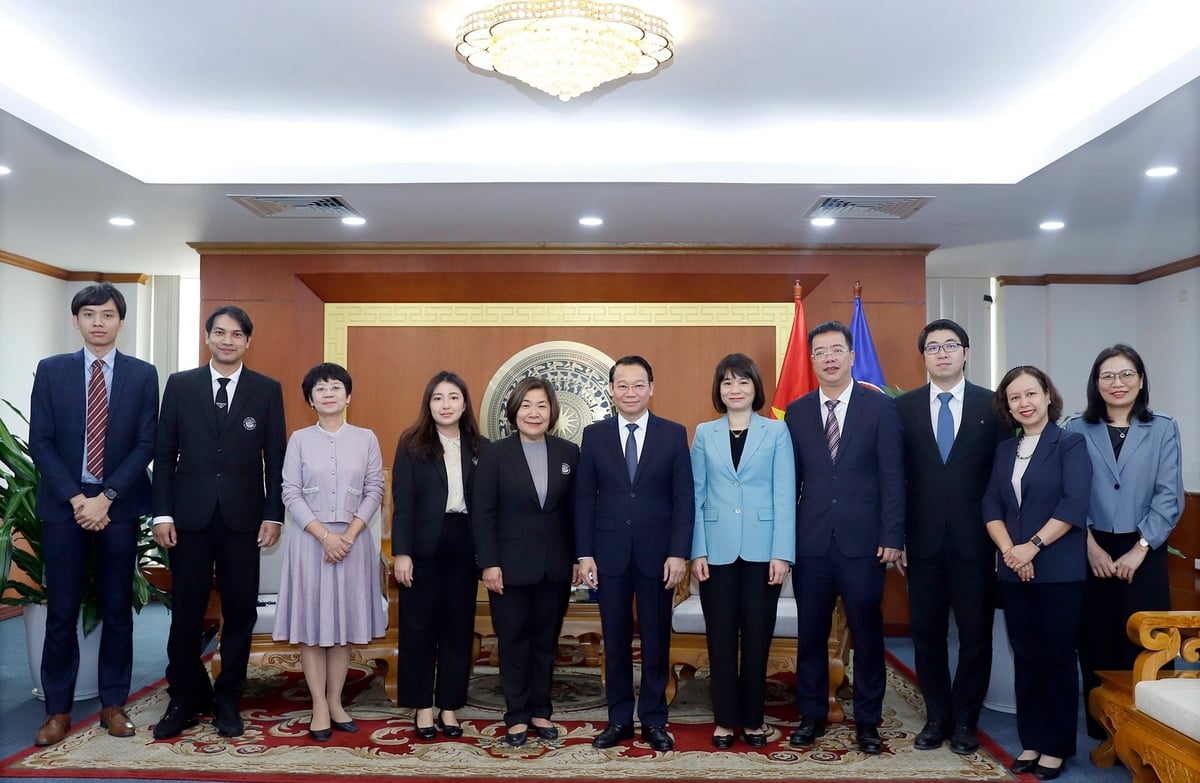
Minister of Agriculture and Environment Do Duc Duy takes a commemorative photo with the delegation from the Mekong River Commission Secretariat. Photo: Khuong Trung.
The CEO of the MRC affirmed that the Secretariat will continue its efforts to serve as a key connector between member countries and development partners. This will help drive effective collaborative projects in the Mekong River basin, with a focus on promoting a sustainable environment and fostering efficient agricultural development in the region.
Building on the discussions during the meeting, Minister Do Duc Duy and Mrs. Boutsadi Santipitaks, the Executive Director of the MRC, agreed on the importance of creating platforms for ongoing dialogue and collaboration. They highlighted that these discussions are vital for addressing the region’s challenges, including natural disasters, water resource protection, and sustainable development. Both emphasized that continued cooperation between MRC member countries and international partners will be key in overcoming the increasing challenges posed by climate change and the need for better water management in the region.
Translated by Phuong Linh

(VAN) Le Hoai Trung, Member of the Communist Party of Vietnam Central Committee and Minister of Foreign Affairs, held talks with Vi Thao, Chairman of the Guangxi Zhuang Autonomous Region (China) this week.

(VAN) The Mekong River Commission adopts the 2026 - 2030 Strategic Plan with a people-centered approach.
/2025/11/26/1720-1-200855_132.jpg)
(VAN) Viet Nam and Japan have many conditions to expand cooperation on climate change adaptation, particularly in disaster risk management based on advanced technologies.

(VAN) The strong development of digital technology and artificial intelligence is opening up opportunities to transform science and technology into a 'Magic eye' for disaster forecasting and early warning.

Applying vaccines and proactive disease prevention helps pig herds stay healthy, maintain productivity, reduce risks, and decrease reliance on antibiotics in modern livestock farming.

(VAN) Many advanced agricultural technologies and products were shared at the Viet Nam - South Korea Agricultural Technology Introduction, Trade Promotion, and Connection Seminar 2025.

(VAN) Minister Tran Duc Thang hopes to strengthen connections and exchanges with China in agriculture and environment sector through the Embassy of Vietnam in Beijing.